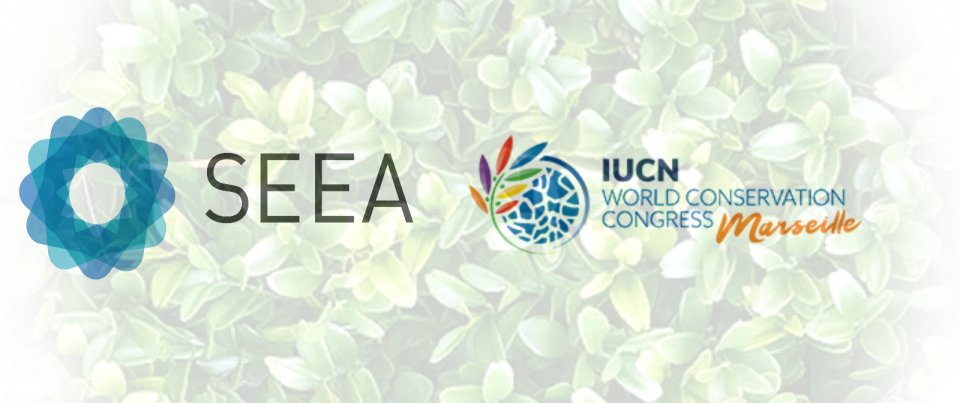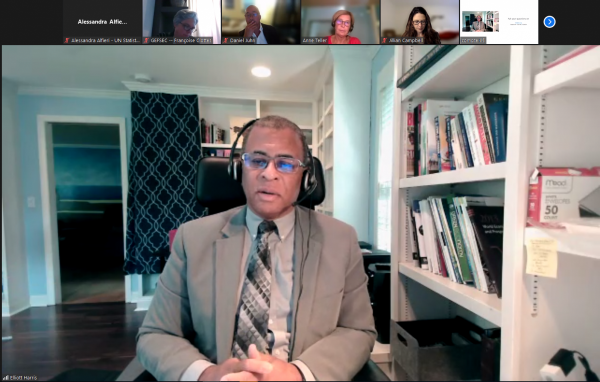Making Nature Count at the IUCN World Conservation Congress

The IUCN World Conservation Congress (WCC) in Marseilles this month, both at its Forum and Member’s Assembly, represented an important step in bringing together the global Natural Capital Accounting (NCA) community with the International Union for the Conservation of Nature (IUCN) conservation community.
In advance of the WCC, the IUCN Resolution on Accounting for Biodiversity, called for the conservation community to mobilize resources to develop and implement accounting for biodiversity, to apply accounting to support the derivation of indicators of biodiversity change and to support its mainstreaming as well as to support national statistical offices on enhancing capacity towards implementation. At the Member’s Assembly, the adoption of the IUCN Resolution on Towards a Policy on Natural Capital marks an important step forward towards the development of an IUCN policy on natural capital. The resolution specifically acknowledges the advancements made with the SEEA Ecosystem Accounting and proposes non-binding principles – including definitions, inclusivity and implementation.
General assembly results of the vote on IUCN Resolution on Towards a Policy on Natural Capital (Credit: Juha Siikamaki)
Over 200 participants attended a virtual Forum session, Incorporating Nature in Development Planning through Natural Capital Accounting, which was organized by Conservation International, the United Nations Department of Economic and Social Affairs (UN DESA) and IUCN. The session provided an important forum for the WCC community to be informed on NCA efforts and further discuss engagement in advancing the research and implementation agenda. In his welcoming remarks, Elliott Harris, Assistant Secretary-General for Economic Development and Chief Economist of the UN, noted that we can no longer rely solely on GDP, which provides an economic-centered view of a country's performance and emphasized the importance of understanding the spill over effects of policies that take into account the environment. The adoption of the System of Environmental-Economic Accounting, Ecosystem Accounting (SEEA EA) as statistical standard, marked a ‘historic step towards transforming the way how we view, value and manage nature.’

Elliot Harris, Assistant Secretary-General for Economic Development and Chief Economist, United Nations (UN) at the IUCN WCC session on ‘Incorporating Nature in Development Planning through Natural Capital Accounting’ (Credit: Alessandra Alfieri)
Bert Kroese, Chair of the UN Committee of Experts on Environmental-Economic Accounting (UNCEEA) and Deputy Director General of Statistic Netherlands, presented a comprehensive overview of the SEEA, while stressing its role in facilitating coordination across various governmental agencies, thus enabling better planning, management, and monitoring of natural resources. Amanda Driver, Senior Policy Advisor for the South Africa National Biodiversity Institute (SANBI) showcased South Africa’s application of SEEA EA and the country’s visionary ten-year strategy for advancing its use for improved decision-making and management of natural resources.
Panelists then highlighted the importance of NCA to their respective institutions. Jillian Campbell, Head of Monitoring, Review and Reporting for the Secretariat of the Convention on Biological Diversity (CBD) addressed the importance of the 2050 Vision of ‘Living in harmony with nature’, and the role of SEEA EA in tracking progress of numerous indicators, as proposed in the monitoring framework of the Global Biodiversity Framework. In addition, Anne Teller, Senior Expert for the European Commission, explained the significance of the SEEA EA for the EU Green Deal, and Francoise Clottes, Director of Strategy and Operations for the Global Environment Facility (GEF) elaborated on the importance of incorporating NCA into GEF projects.
Several speakers stressed how the green recovery in the wake of the pandemic and climate change, presents the imperative to transform the status quo and move towards a green economy and more sustainable management of natural resources, and the key role of SEEA EA toward such effort. They also provided a rallying cry for a concerted, long-term effort, calling on the conservation community to support the implementation NCA as a transformative shift toward long-term solutions to the challenges of economic development and biodiversity conservation.
More on the session can be found here:
- Event page: https://seea.un.org/events/incorporating-nature-development-planning-thr...
- Article on the UN DESA website: https://www.un.org/en/desa/ecologists-and-economists-come-together-make-...
